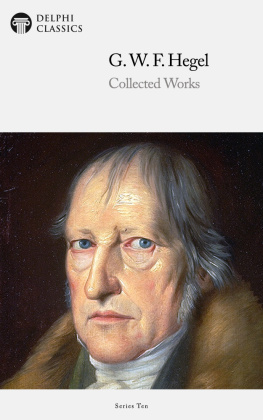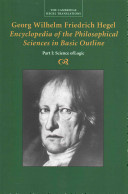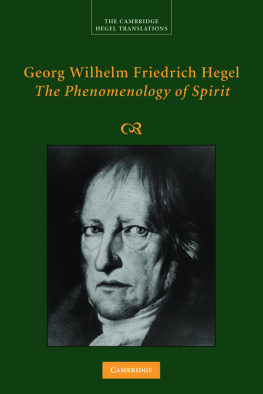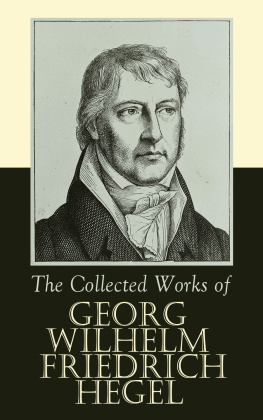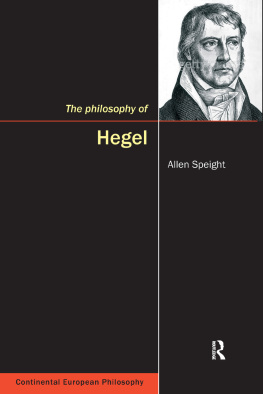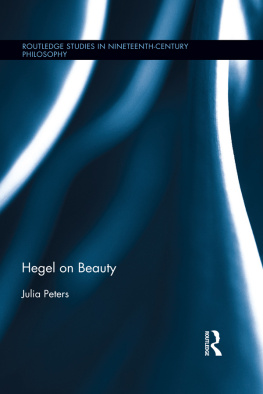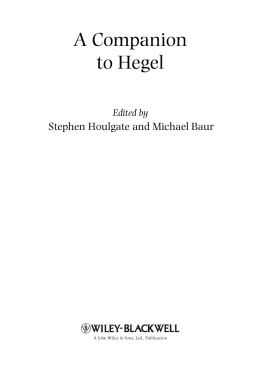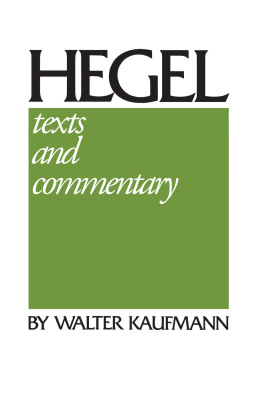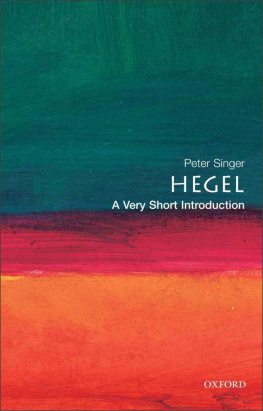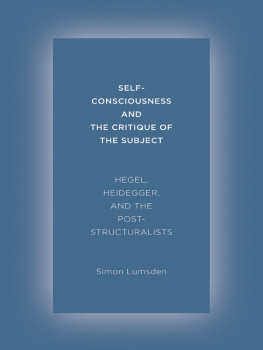
The Collected Works of
GEORG WILHELM FRIEDRICH HEGEL
(1770-1831)

Contents

Delphi Classics 2019
Version 1


Browse our Main Series

Browse our Ancient Classics

Browse our Poets

Browse our Art eBooks

Browse our Classical Music series

The Collected Works of
G. W. F. HEGEL

By Delphi Classics, 2019
COPYRIGHT
Collected Works of Georg Wilhelm Friedrich Hegel

First published in the United Kingdom in 2019 by Delphi Classics.
Delphi Classics, 2019.
All rights reserved. No part of this publication may be reproduced, stored in a retrieval system, or transmitted, in any form or by any means, without the prior permission in writing of the publisher, nor be otherwise circulated in any form other than that in which it is published.
ISBN: 978 1 78877 984 5
Delphi Classics
is an imprint of
Delphi Publishing Ltd
Hastings, East Sussex
United Kingdom
Contact: sales@delphiclassics.com

www.delphiclassics.com
Parts Edition Now Available!

Love reading Georg Wilhelm Friedrich Hegel ?
Did you know you can now purchase the Delphi Classics Parts Edition of this author and enjoy all the novels, plays, non-fiction books and other works as individual eBooks? Now, you can select and read individual novels etc. and know precisely where you are in an eBook. You will also be able to manage space better on your eReading devices.

The Parts Edition is only available direct from the Delphi Classics website.
For more information about this exciting new format and to try free Parts Edition downloads , please visit this link .
Interested in Hegel?

These comprehensive editions are beautifully illustrated, packed with bonus texts and offer eReaders some of the greatest philosophical works ever written.
Explore our Philosophers...
The Books

Stuttgart, Baden-Wrttemberg, Germany Hegels birthplace

The birthplace of Hegel, which now houses the Hegel Museum

Drawing of Stuttgart, 1794

The historic Stuttgart Marktplatz looking west, 1881

Tbinger Stift, a hall of residence and teaching, owned and supported by the Evangelical-Lutheran Church in Wrttemberg, in the university city of Tbingen, at the age of eighteen, Hegel entered the Tbinger Stift, where he had as roommates the poet and philosopher Friedrich Hlderlin and the philosopher-to-be Friedrich Wilhelm Joseph Schelling.

Tbingen Altstadt from the Stiftskirche bell tower
The Phenomenology of Spirit

Translated by J. B. Baillie
First published in 1807, Phnomenologie des Geistes was described by its author as an exposition of the coming to be of knowledge, explicated through a necessary self-origination and dissolution of the various shapes of spirit as stations on the way through which spirit becomes pure knowledge. The book marked a significant development in German idealism, following on from the work of Immanuel Kant. Focusing on topics in metaphysics, epistemology, physics, ethics, history, religion, perception, consciousness and political philosophy, Hegel uses the treatise to develop his concepts of dialectic (including the masterslave dialectic), absolute idealism, ethical life and Aufhebung. Phnomenologie des Geistes has had a profound effect on the course of Western philosophy and has been linked with the development of existentialism, communism, fascism, death of God theology and historicist nihilism.
The book consists of a Preface, an Introduction, and six major divisions of varying size: Consciousness, Self-Consciousness, Reason, Spirit, Religion, and Absolute Knowledge. Most of these sections have further hierarchical subdivisions, and some versions of the books table of contents also group the last four together as a single section on a level with the first two. Due to its obscure nature and the many works by Hegel that followed its publication, even the structure or core theme of the book itself remains contested Hegel wrote the book under close time constraints, with little chance for revision (individual chapters were sent to the publisher before others were written). Also, the text abounds with both highly technical argument in philosophical language, and concrete examples, either imaginary or historical, of developments by people through different states of consciousness. The relationship between these is disputed: whether Hegel meant to prove claims about the development of world history or simply used it for illustration; whether or not the more conventionally philosophical passages are meant to address specific historical and philosophical positions; and so forth.
Next page
